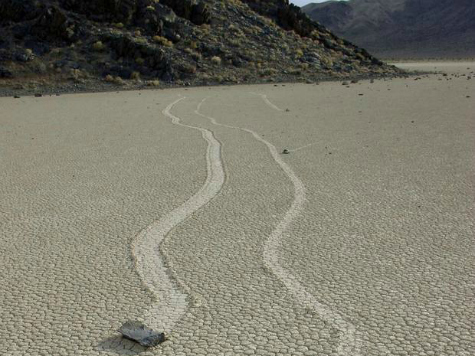
Scientists at the Scripps Institution of Oceanography at the University of California, San Diego, have solved the mystery-phenomenon of Death Valley’s moving rocks, which have for years moved across the desert on their own.
Theories which have been floating around since the 1940s surrounding the movement of the rocks, which zig-zag across California’s Racetrack Playa in Death Valley National Park, have finally been proven with the formal discovery that the rocks are propelled forward by winds “on sunny, clear days, following nights of sub-freezing temperatures.” That according to a report which was published by researchers, and cousins, Richard Norris and James Norris in the online scientific journal PLOS ONE on Wednesday, according to the Associated Press.
The pair concluded that on rare occasions when the desert would receive overnight rains, the cold temperatures – which are common during the winter months – would freeze the moisture, creating ice sheets. Those ice sheets would then be melted by the rising desert sun, resulting in a muddy and slippery surface on the flat and ordinarily hard ground. The slippery surface moisture in conjunction with light winds would then propel the rocks forward.
“We were sitting on a mountainside and admiring the view when a light wind kicked up and the ice started cracking. Suddenly, the whole process unfolded before our eyes,” said Richard Norris to the Los Angeles Times.
In December of last year, the cousins Norris compiled a list of 60 rocks which they noticed had moved across the Death Valley’s playa surface, which used to be a lake bed. Following that, and with permission from the National Park Service, they reportedly installed a weather station along with 15 “GPS stones” which were engineered to record movement and velocity, notes the AP.
According to their report, the rocks would move at an average of 15 feet per minute.
The “GPS stones” were placed in the same area of the playa where the mysterious moving rocks would begin their journey after they would come tumbling down from the cliffs. Upon their return to the site at the end of last year, the Norris’s noticed “fresh rock trails near shards of thin ice stacked up along the shoreline.” That is when they witnessed first-hand the phenomenon unfold before their eyes.

COMMENTS
Please let us know if you're having issues with commenting.